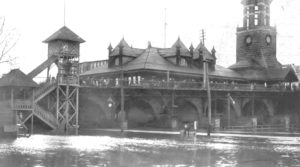As Irma hits Florida, it’s a good time to ask: Are you prepared for an emergency?
September 10, 2017
As Hurricane Irma tears into Florida, it seems like the perfect time to re-visit a subject we’ve written about several times in the past: emergency preparedness.
With late summer and early fall comes hurricane season – and we’ve often felt the after-effects of coastal storms all the way up in the Lehigh Valley region.
As a recent article in The Morning Call points out, “Pennsylvania has more rivers and streams than any other state in the continental U.S. And, it’s been a decade since the Lehigh Valley saw its last major flood along streams and rivers that flow through it.”
So while we’re blessed with a wealth of waterways, they can come with a heavy price when a major storm hits.
According to NJ.Com, “The most devastating flood of the Delaware River, ever recorded, occurred on August 19 and 20, 1955 … ‘The warm moist air mass that had covered this area for days was penetrated by Hurricane ‘Diane,’ which weakened, as its low pressure area moved rapidly from Northern Virginia to Cape Cod. An effect was to force the warm air higher, where it cooled quickly and was unable to hold its moisture. The ground was already drenched from Hurricane ‘Connie’ and there was no place for water to go except in run-offs in tributary creeks of the Delaware and other rivers.’ The flood water destroyed four free bridges and caused considerable damage to others.”
If such a storm happens again — and it’s entirely probable — are you prepared? Flooding could render roads and bridges impassable. The region could experience power outages, flood damage, and even shortages of food and clean water.
Or what if a winter ice storm or snowstorm hits, downing power lines and making travel impossible?
First off, you need a plan.
First off, you need a plan.
The National Weather Service has a page dedicated to what you should do in the event of a flood. Some of the tips include Turn Around, Don’t Drown if you reach a flooded road; definitions of flood hazards such as flash floods, storm surges, river floods and more; and flood safety. It’s a good place to start.
However, we also recommend following the advice of organizations such as The American Red Cross, Ready.gov; the CDC, and FEMA. Their tips include:
1.) Complete a contact card for each member of the family, which will include home, cell and work phone numbers, social media identification (for instance, Facebook and Twitter usernames); additional contact information for schools, workplaces, friends and other family members; email addresses; important medical information, and more.
2.) Choose an emergency contact, such as a family member, and memorize their phone number.
3.) Teach everyone how to text — from your your pre-schooler to grandma — and ensure everyone knows how to use a cell phone.
4.) Identify the safe spots in your home for each type of natural disaster. During a tornado or other storm with high winds, that’s a low spot away from windows. In an earthquake, it’s in a sturdy area, such as under a well-built desk or table.
5.) Identify several escape routes from your house to use in case of a fire, flood, or other natural disaster.
6.) Pick out several meeting places, and make sure everyone knows where they are. It could be outside of your house near a shed in case of a fire, or at a neighbor’s house, or somewhere outside of the neighborhood, like your Aunt Patty’s house.
7.) Identify family members’ responsibilities in the event of an emergency. For instance, mom grabs the emergency kit; Dad is in charge of getting the car; a son gathers blankets; a daughter rounds up pets.
8.) Teach your children how to call 911, and when to use it.
9.) Make an emergency kit, which includes things like any medication family members require; first-aid supplies; flashlights; clean water; and more.
10.) Have a plan for your pets.
11.) Know where to turn off your home’s electrical, water and gas supplies.
12.) Plastic 2-liter soda bottles can be rinsed out after use, then filled with water, capped, and placed in a freezer. If the power goes out, they’ll provide some backup cooling power and extend the life of your frozen food. They can also be a great source of clean water.
13.) Make sure your home insurance is up-to-date, and review whether you should have flood insurance or other natural disaster insurance.